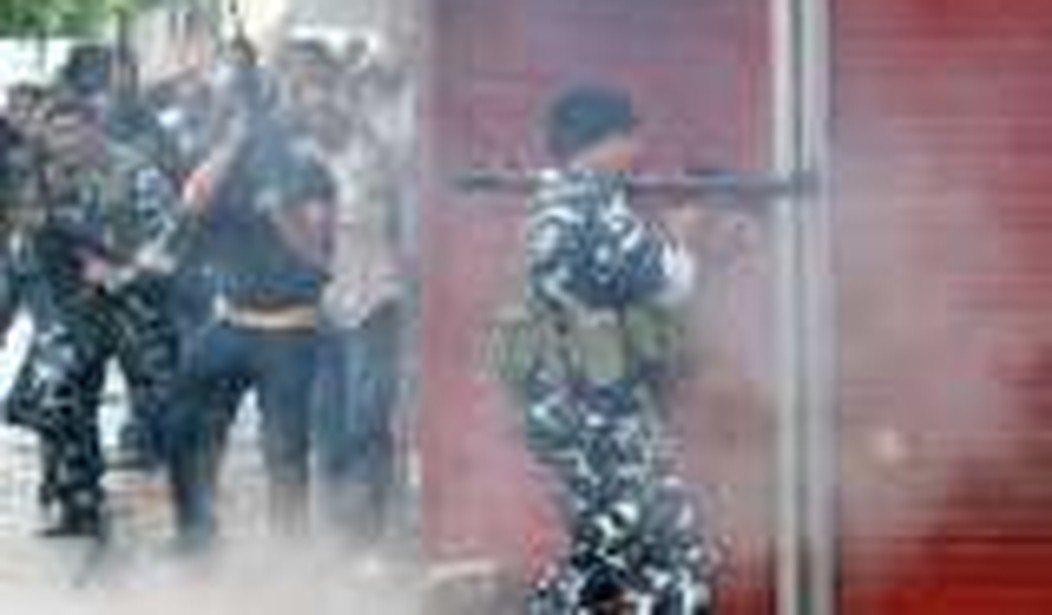The sudden eruption of clashes between Hezbollah and supporters of the Lebanese government trapped residents of central Beirut in their houses for nearly 24 hours.
The loud weapons being fired ended suddenly on Friday afternoon with Hezbollah in full occupation of Beirut. However, New TV is reporting that Hezbollah is now marching on the Druze suburbs south of Beirut. There are also reports of clashes in the northern city of Tripoli.
Shop owner Ali Amin contends, “We had no prior warning. There are always clashes in mixed areas during protests, but we had no idea that it would escalate when things started on Wednesday. I went to work on Thursday, and got trapped in my shop.”
Rania, a student at the American University of Beirut, notes, “My mother went to watch [Hezbollah Secretary General Hassan] Nasrallah’s speech at a friend’s house in [the Christian area of] Ashrafieh. The fighting started immediately after, and she had to stay there. My younger brother was at home all by himself. I got stuck at my boyfriend’s place, which was really awkward.”
A local pub owner spent Thursday night in his pub eating steak, watching TV, and listening to the Hezbollah, Amal, and Syrian Social Nationalist Party gunmen fire at opponents in the street. He says, “I was doubly trapped. There was fighting around my pub, and there was fighting in the area around my house. I had no choice.”
The Lebanese Army and the Internal Security Forces (ISF) did not participate in the fighting. Hezbollah faced little opposition to its takeover of the city. Druze leader Walid Jumblatt publicly declared that he put his faith in the Lebanese government, and would not allow Hezbollah’s militia to force private citizens and political parties, including his well-armed Progressive Socialist Party, into a clash.
Hezbollah militiamen and their allies from the Shia Amal Movement and the Syrian Social Nationalist Party (SSNP) now patrol the streets of West Beirut. One Hamra resident, observes, “Militia guys are all over the place, every couple a meters. The SSNP is putting up their flag everywhere, and I saw a couple new posters of [Syrian President] Assad.”
Bullet casing line the sidewalks of West Beirut. However, damage to buildings and other infrastructure appears to be minimal. It appears that a good portion of the weapons fired were intended only to intimidate. West Beirut resident Faisal claims, “They hit some things, but I think it was accidental. I had a full view of the snipers and the RPGs on the roofs. They fired a lot, but primarily into the air.”
An American teacher living in the central Beirut neighborhood of Koreitem, where parliamentary majority leader Saad Hariri’s compound is located, asks, “You would think that they would have put up barricades on the streets to try to stop Hezbollah from entering? But it didn’t look like they did. Some guys on one side kept firing in the air, and some guys on the other side did the same thing. Then, there was a big burst of gunfire from one side, and then everything was Hezbollah’s. It was really weird. Hariri didn’t even put up a fight.”
Christian suburbs north of Beirut were unaffected by the violence in Beirut. The thousands of Christians who work in the capital are unable to go to work, but for Christians who live and work in the affluent north Beirut suburbs, it is business as usual. Karin writes from her office in the city of Jounieh saying that she worked for 21 of the 34 days of the 2006 war, only finding her commute difficult after Israel bombed the bridge next to the Casino du Liban. She notes, “From my location, I have a view of Beirut and can see plumes of smoke and activity below. My region is fairly quiet however the local market last night looked pretty ransacked to me of basic staples such as bread. Stockpiling has started.”
While suburban Christians try to figure out what exactly happened in Beirut over the last three days, Beirut residents are left pondering the status of the nation. Ziad asks succinctly, “Was this a coup? Hezbollah took land, but does not control the state. What happens, now? Does this mean anything, like getting rid of the VAT [value added tax on consumable products], or do we just have a different police force in our streets?”
Charles Chuman is a media and political analyst currently in Beirut.









Join the conversation as a VIP Member